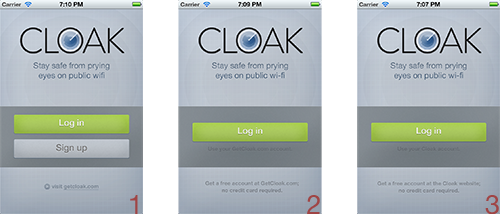Kindle Clauses
A few weeks ago, I submitted Cloak for inclusion in the iOS App Store. I’m proud to announce that Apple has now rejected Cloak… twice!
We have only the Kindle to blame. Well, the Kindle Clauses, to be precise.
The dreaded Kindle Clauses are two bullet points (11.2 and 11.13) in Apple’s ever-growing App Store Review Guidelines. Developers must comply with these guidelines before Apple will accept their apps.
Apple nearly always makes decisions that benefit its users. In the case of the Kindle Clauses, Apple effectively threw its users under the bus in an attempt to drive a dagger through Amazon’s heart. (Not coincidentally, the Kindle Clauses were introduced around the time the iBookstore went live.)
Clause 11.2 prohibits third party billing systems in iOS applications. After its introduction, Amazon’s own accounts, along with the billing systems of many other great iOS apps, became persona non grata. An argument can be made that clause 11.2 improves life for users by unifying the purchasing experience across all applications. But I find it far more likely that Apple simply decided to take advantage of its mobile catbird seat and commandeer a 30% cut of all purchases in the iOS ecosystem. An important bonus: Amazon is a high-volume, low-margin business that can’t withstand a 30% hit. Dagger: drawn.
Clause 11.13 is far more nefarious. To work around billing restrictions, Amazon added a “Buy Kindle Books” button that linked to the Kindle web site. Apple couldn’t exactly prevent Amazon from selling stuff on Amazon’s own site, so the App Store team upped the ante. Clause 11.13 prohibits iOS applications from linking to any site that provides its own billing system. Again, an argument can be made that Apple introduced 11.13 to protect its users (especially its most naive and vulnerable users) from untrustworthy billing systems. But because inclusion in the App Store is, by itself, a strong signal of trustworthiness, it’s hard for me to accept this argument at face value. More instructive, I think, is to look at 11.13’s impact on the Kindle app. In order to comply, Amazon had to remove links from the Kindle app to the Kindle bookstore. Beyond linking, 11.13 prohibits merely documenting where users should go. The result is an awful experience for Amazon’s users: they open up the Kindle app and have no idea how to buy books. Dagger: plunged.
As far as Cloak goes, we had compelling reasons to build our own billing infrastructure. First, customers — in particular, business customers — made it clear that they needed Cloak on many platforms; we love the Apple ecosystem but we have to be realistic about what we’re building. Tying ourselves exclusively to Apple’s In-App Purchase program was never an option. At the same time, there are only three of us at Cloak. At our small size, it’s simply untenable for us to support multiple billing systems. To do so would require complex integration and synchronization; our time is better spent elsewhere. Interestingly, the least of our worries was Apple’s 30% cut: we have high enough margins that, while painful, we could take the hit.
What’s the upshot for Cloak? It will land in the App Store — probably soon now that we’ve weathered a few rejections and understand the Kindle Clauses in more detail. But it will land in a neutered state that benefits neither our users nor Apple’s. Witness the evolution:
Apple needs to take a deep breath and reconsider its approach to these difficult issues. In my opinion, the current state of affairs harms Apple’s users and developers while providing questionable value in return.
